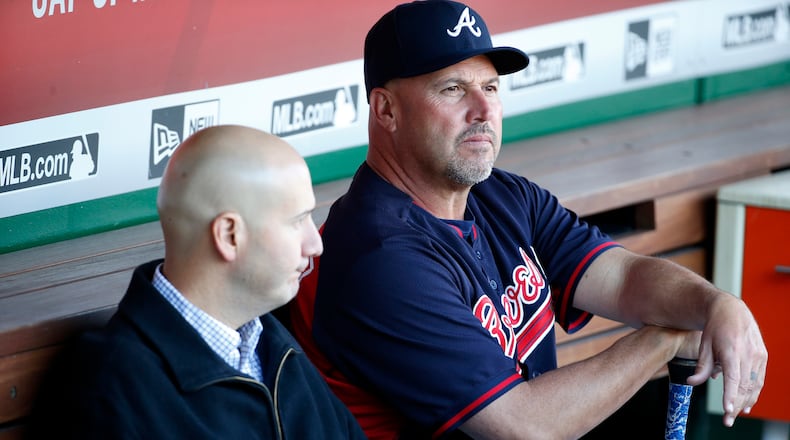Consider the stock market the financial world's version of the major league baseball standings, because in either case the public sees the word, "Braves," and thinks, "Feh."
So it was that when the Braves hit the stock market for the first time Monday with an opening price of $36 per share, investors walked in the other direction -- probably to spring football. As Tim Tucker writes , Liberty Braves Group's Series A shares never rose above the asking price and "plummeted quickly and closed at $19.95 — down 44.6 percent" from the opening price.
If Wall Street has a playoff system, Braves' stock will be eliminated from contention before the All-Star break.
I bring this up for two reasons: 1) I thought it was funny; 2) If some people look sideways when trying to see the Braves' future, it's at least in part because of the Hector Olivera trade . The Braves (3-9, though on a three-game winning streak) acquired Olivera from the Los Angeles Dodgers in a three-team, multi-player deal last July 30, in which they gave up young lefthanded starter Alex Wood.
The Braves play the Dodgers tonight at Turner Field. Wood starts for the Dodgers. Olivera sits for the Braves. But at least he's out on bail.
I didn't understand the trade at the time the Braves' John Hart and John Coppolella made it. Unlike other deals, in which the Braves and owner Liberty Media -- a Fortune 500 company, so they always make the playoffs -- wanted to dump impending free agents and blow up the payroll, Wood should have been considered a keeper. He was young (25) and good (3.10 ERA in his first two-plus major-league seasons) and cheap ($530,000 this season). He's not eligible for free agency until 2020.
Wood hasn't been great for the Dodgers: 1-1, 4.50 this year; 6-7, 4.37 since the trade. He had a strikeout/walk ratio of 337/108 Strikeouts (3.12 to 1) with the Braves. He's at 55/28 (1.96-1) with L.A. But I think I'd rather bank on his future right now than Olivera's.
Olivera, as you know, was shelved indefinitely by major league baseball until there's some resolution in his assault and battery case. He was arrested during last week's series against Washington in Arlington, Va., after a woman accused him of assault. The woman had bruises and was treated at an Arlington hospital for injuries, according to police.
I attempted to obtain some details on the investigation this week, via the Freedom of Information Act, but was told further information is being withheld pending the investigation. But according to police: "A female victim alleged that a male suspect assaulted her. The female victim had minor injuries such as visible bruising. As a result of the subsequent investigation, Hector Olivera, was arrested and charged with assault and battery."
Olivera isn't like most "rookies." He is 31 years old, and therefore has to develop quickly, as I wrote about here during spring training. Hart and Coppolella believed they were getting a sweet deal because the Dodgers had already outbid every other team and paid Olivera a $28 million signing bonus. But the fact is the Braves remain on the hook for more than $32 million in salary through 2020, and early returns on their investment are not good.
There's something else about the trade that always has bothered me: The Dodgers were so convinced Olivera would be a prize signing that they gave him a huge contract and signing bonus. What was it that made them suddenly change their mind ... only two months later ... to the extent that they would eat a $28 million signing bonus?
I didn't like the deal then. I certainly don't like it now.
And $19.95 a share is still too high.
- Jacob Eason good but 93,000 is real highlight of Georgia's spring
- Hawks go into playoffs knowing changes to core may be ahead
- Braves (0-8) vs. Twins (0-8): Your 2017 World Series may be on deck
- Braves' 0-7 season takes an even uglier turn with Olivera arrest
- Manziel, Gordon should be viewed as sad stories, not punchlines
- Criticism of Georgia Tech's Pastner seems over the top
- Braves (0-5) are a minor league product in a major league season
- 'Religious liberty' bill turned into an Alabama-Vanderbilt game
- Tim Hardaway, Jr. impressing critics, Hawks and his father
- OK, Mike Bobinski, let's see what you've got
- (Early) Nothing Gregory did this season was going to save his job
- Kirby Smart is wrong ... but then so is everybody else on transfers
- Ranking Atlanta's top coaches, from Budenholzer to... um...
- Sticky ball? NBA looks like bigger goofball than Dwight Howard
- Where sports and politics collide, Georgia loses
- Georgia legislators step in it, could lose Super Bowl, other events
- Brian Gregory fighting 'disappointment' of uncertain future
- Keith Marshall had fast combine time but is he NFL running back?
- Taking a Digi-Blog stroll through Georgia's spring practice
- Kirby Smart's fingerprints are all over changes at Georgia
- Goodell may be stripped of player discipline power (it's about time)
- Dan Quinn staying loyal to Shanahan, staff amid heat
- $32 million for Sanu? Falcons overpaid to replace Roddy White
About the Author
Keep Reading
The Latest
Featured


